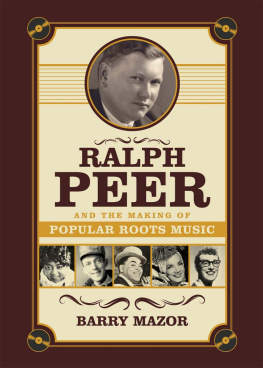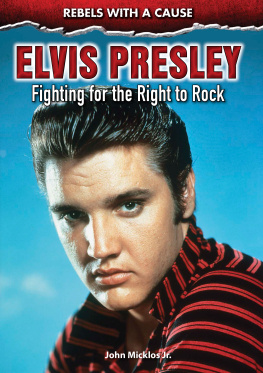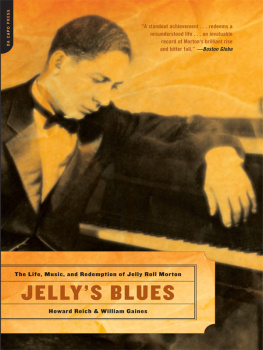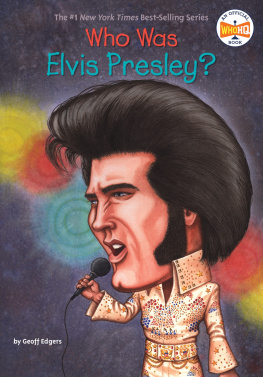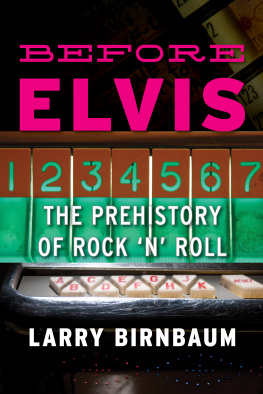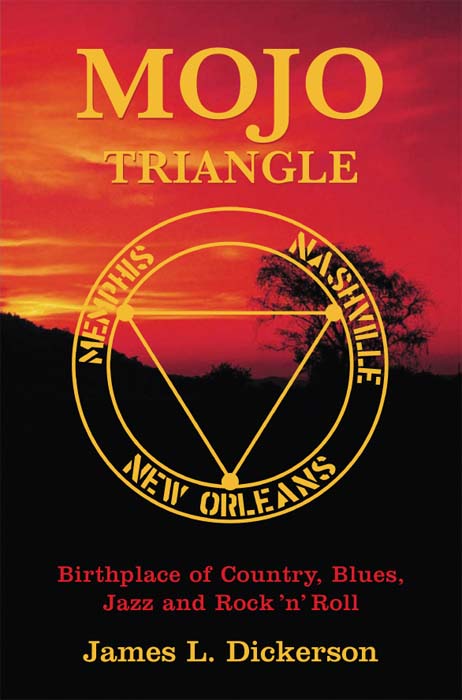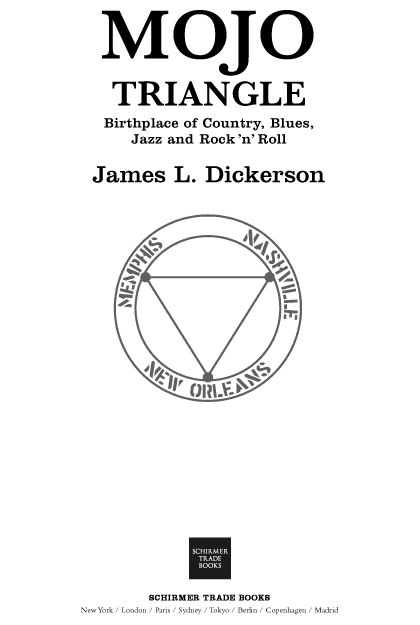WHAT OTHERS ARE SAYING ABOUT THIS BOOK
A rich and rewarding book.
B ETH G OEHRING , The Literary Guild
Mojo Triangle is the seminal nexus of psychology, history, and aesthetics. It crystallizes the essence of Ernie K-Does quote, Im not sure, but Im almost positive, that all music came from New Orleans. Black Top Records CD entitled Neville-Ization is perhaps the best example of The Gumbo That Keeps on Giving. Ditto for Otis Reddings original version of Respect that encapsulates the Memphis sound in Great Balls of Fire. Dickersons notion of genetic and cultural history is supported by Jungs psychological archetype. The fruits of natural expression are indeed country, blues, jazz, and rock n roll.
G REG G ORMANOUS , Ph.D.
Psychologist and Professor of Psychology
Louisiana State University at Alexandria
In the search for a unified-field theory of American popular music, few journalists come as well equipped as James L. Dickerson. Blessed with the scene-setting panache of a natural storyteller, an eye for the telling detail, and the audacity to reach for the big picture, Dickerson has walked back out of the jungle bearing this remarkable, pioneering compendium. The mojo triangle of his title is what you get when you play connect-the-dots with Memphis, Nashville, and New Orleans: A multicultural musical stew, four kinds of holy ground, andnot incidentallya land bisected by the Natchez Trace, ancient footpath of an Indian tribe whose vital antebellum contributions to black and white musical traditions are merely one of this books many revelations. Again and again Dickerson dredges up forgotten or suppressed histories and teases out connections that other historians of southern music have missed. I learned a great deal from this book.
A DAM G USSOW , author
Mister Satans Apprentice: A Blues Memoir and
Seems Like Murder Here: Southern Violence and the Blues Tradition
Mojo Triangle asserts that while Americas popular music may be worldwide in scope, its all still being created in that mystical cauldron of the South. Mojo Triangle doesnt miss a single ingredient in analyzing the recipeor the cooks. It dissects important and previously obscured elements as diverse as genetics and the influence of Native American culture on blues and rock n roll.
B ROWN B URNETT , editor,
BlueSpeak Magazine
Mojo Triangle is a very good book. Author Jim Dickerson, a southerner himself, has written a great, in-depth history of the area and its musical background all aimed at the birthplace of American music. He hit it right on the button.
S COTTY M OORE ,
Guitarist and Elvis first manager
Copyright 2005 James L. Dieckerson
This edition 2010 Schirmer Trade Books
(A Division of Music Sales Limited, 14-15 Berners Street, London W1T 3LJ)
ISBN: 978-0-85712-507-1
The Author hereby asserts his / her right to be identified as the author of this work in accordance with Sections 77 to 78 of the Copyright, Designs and Patents Act 1988.
All rights reserved. No part of this book may be reproduced in any form or by any electronic or mechanical means, including information storage and retrieval systems, without permission in writing from the publisher, except by a reviewer who may quote brief passages.
Every effort has been made to trace the copyright holders of the photographs in this book, but one or two were unreachable. We would be grateful if the photographers concerned would contact us.
A catalogue record of this book is available from the British Library.
For all your musical needs including instruments, sheet music and accessories, visit www.musicroom.com
For on-demand sheet music straight to your home printer, visit www.sheetmusicdirect.com
To my college roommate, Billy Bobbs, an Ole Miss Deke
who kept the music of Bobby Blue Bland,
Mose Allison, and Jimmy Reed wafting through Kincannon Hall.
CONTENTS
Chapter One Natchez Under the Hill
The Cradle of American Music
Chapter Two The Apocalyptic Furies
Earthquakes, Pestilence, Floods, War, Night Terrors
Chapter Three The Natchez Trace
Spiritual Aorta of the American Experience
Chapter Four Mississippi Delta
Highway 61 Revisited
Chapter Five Memphis
Great Balls of Fire
Chapter Six New Orleans
A Gumbo That Keeps on Giving
Chapter Seven Muscle Shoals
When a Man Loves a Woman
Chapter Eight Nashville
Workin On the Next Big Thing
ACKNOWLEDGEMENTS
I would like to thank the following individuals for their help with this book, which from conception to completion, was about twenty years in the making: Allie and Mattie, for their help during the hectic days while the book morphed from thought to computer screen (the book could not have been written without them); Marty Stuart, with whom Ive shared conversations about music for twenty years; Jimmy Johnson and David Hood; the late Johnny Cash and the late Waylon Jennings, both of whom allowed me into the studio while they made records; Amanda Williams at the Mississippi Band of Choctaw Indians (MBCI) Archives; the late Stevie Ray Vaughan, who always made time to talk about the blues; Dave Edmunds; the late Carl Perkins, who, with a straight face, told me I had rhythm after I substituted for Jerry Lee Lewis in Carls video; the late Sam Phillips; Chips Moman, one of the most creative and loyal people I know; Scotty Moore, who, besides being the most important guitarist that ever tuned a Gibson, is a great friend; the late Chet Atkins; the incomparable Jerry Lee Lewis; the late Roy Orbison; Rick Blackburn, Joe Galante, and Pam Lewis; Jack Clement, who, after fifty years in the music business, hasnt lost his sense of humor; the late Estelle Axton, Jim Stewart, Bobby Manuel, Rufus Thomas, Booker T. Jones, Steve Cropper, Duck Dunn, and Don Nix; the staff at the Flowood Public Library; the staff at the Mississippi Valley Collection at the University of Memphis; the staff at the Jean and Alexander Heard Library at the Vanderbilt University Library; my agent for this project, Bob Diforio; and my editor at Schirmer Trade Books, Andrea Rotondo, who believed in the book.
ABOUT THE AUTHOR
The author of 18 non-fiction books and over 2,000 magazine and newspaper articles, James L. Dickerson has been the dominant voice in the South for 25 years on matters related to popular culture and music.
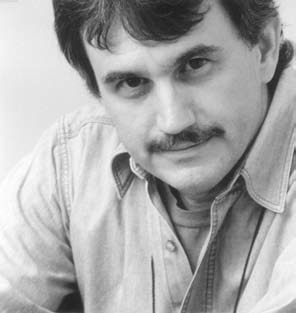
Born and raised at the intersection of Highways 61 and 82, the heralded blues crossroads of the Mississippi Delta, Dickerson attended the University of Mississippi, where he played keyboards and sax in a series of well-known Southern college bands, including the Dynamics, the Roadrunners, and the Strokers. After leaving college, Dickerson put his sax and keyboards aside to write for a living. His first magazine article, an interview with singer Bobbie Gentry, was published in 1967.
After becoming a regular contributor to the book pages of the Baltimore Sun and the



